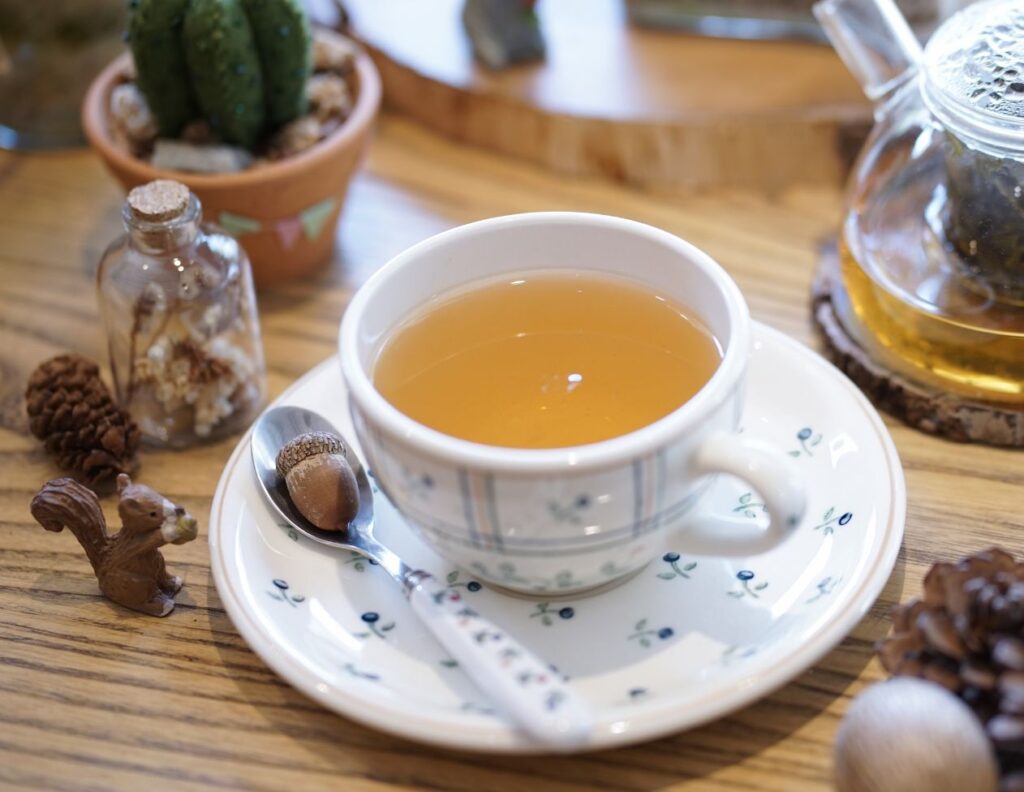Want to learn how to make acorn tea and the most important acorn tea uses? Continue reading and discover the original acorn tea recipe.
Acorns are a real health elixir due to their rich content of proteins, carbohydrates, tannins, fatty oils, and starch. Moreover, they contain a very active substance called quercitin, with many therapeutic properties: it is a strong anti-inflammatory, suppresses the multiplication of tumor cells, plays an important role in controlling diabetes, promotes insulin secretion, and has diuretic and antioxidant properties. In addition, acorns have a beneficial effect on the digestive system: acorn tea in particular is used for stomach disorders and acute and chronic colitis. But before we show you how to make acorn tea, let’s see how to harvest these tiny healers.

How to Harvest Acorns
Acorns are harvested in late September and October when they are fully ripe. Only the green-brownish acorns that are hard to the touch, are harvested. If pressing them with your finger easily breaks them, it means that the acorns are wormy, so leave these out. After harvesting, dry the acorns naturally in a dark place for 3-4 weeks. To speed up the process, you can put them in a dehydrator or in the oven and dry them at 50°C/122°F for 2-3 days. Then grind them and store them in paper bags or glass jars. We do not recommend consuming acorns that fall in the first week of September, as these can be weak or may be infested.
Careful! Raw, uncooked acorns can be harmful if you suffer from urinary bladder problems. Ask for a doctor’s advice if you want to use acorns internally.
4 Amazing Acorn Tea Uses – How to Make Acorn Tea
- Digestive Issues – Pour a cup of boiling water over a teaspoon of crushed acorns, steep for 15 minutes, and then strain. The dosage is half a cup, three times a day for one month. Pause for 30 days, then resume if needed.
- Pancreatitis – Harvest the acorns while they are still green and leave them to ripen in a dry and shady place. For pancreatitis, only the “caps” of the acorns are used. Put them in the oven or fry them in a pan over low heat, then grind. Pour 200 ml of boiling water over a spoonful of acorn caps powder, cover, and steep for 2-3 hours. Strain and have one teaspoon on the first day, and gradually increase the dose, until you reach 60-70 milliliters/day. Divide this portion into three equal parts and drink each portion 30 minutes before eating. If the taste is unpleasant, you can soak a piece of bread in it, and eat the bread.
- Lung Problems – Pour 350 milliliters of boiling water over 3-4 teaspoons of acorn powder, steep, and then strain. The dosage is one tablespoon before lunch, for 2-3 months.
- Anemia & Rickets – Boil a teaspoon of acorn powder into a cup of water for 1-2 minutes, strain, and drink 2-3 warm cups a day.
More Acorn Recipes:
Acorn Powder
Acorn Coffee Recipe
Centuries back, acorns were considered a treasure of the forest and were used as medicine for people as well as food for the animals, during the winter. At the same time, acorns were also used in magic and alchemy. The reason is that it was believed that they contain a secret essence of the oak’s vigor, able to restore strength to the sick, prolong youth, and bring luck and prosperity.
Acorns are a gift from the forest and anyone can harvest their own acorns to make simple and natural medicine. If you’ve enjoyed learning how to make acorn tea and the amazing acorn tea uses for health, please share this article so more people can use this information. Stay healthy, naturally!
Share on Pinterest ❤️

